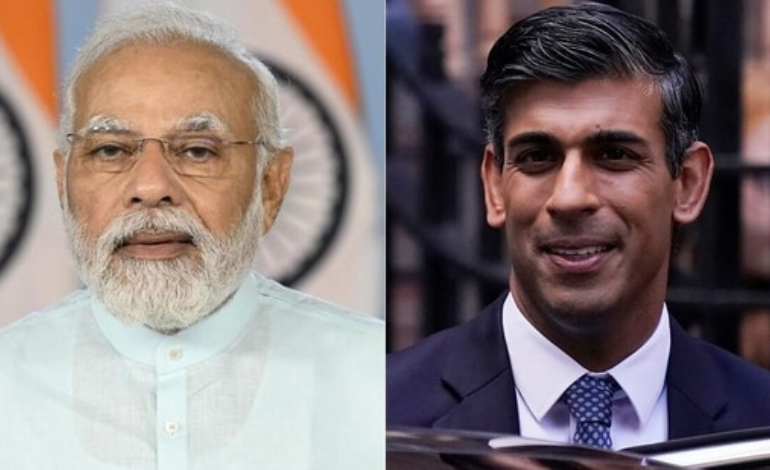
Prime Minister Narendra Modi was among the first world leaders to congratulate Rishi Sunak on becoming the Prime Minister of the United Kingdom, but improvements in the two countries' relations will only come about if old structural barriers are addressed.
Upon Rishi Sunak's appointment as the new prime minister of the UK, Prime Minister Narendra Modi tweeted his congratulations. In his cordial message, Prime Minister Modi underlined his desire to collaborate closely with Sunak on international issues and carry out Roadmap 2030. As the first non-white and Hindu British Prime Minister and leader of the party with a majority of white voters, Sunak's selection sparked a social media frenzy in India.
Although the diaspora's view of Sunak is positive, it is important to keep expectations for the new UK PM in check because some structural barriers prevent relations between India and the UK from developing as they may. The largest worry is that leaders of Indian descent in third nations tend to overcompensate for their so-called minority disadvantage and are more loyal than the king when dealing with their home country. This concern is backed up by previous occurrences.
Suella Braverman, Sunak's home secretary and a person of Indian descent, is the most famous and recent example. While serving as home secretary during Liz Truss' brief administration, she claimed that the proposed free trade agreement between India and the UK would undermine Brexit goals and promote immigration to the UK. According to her, Indian immigrants often overstay their visas in the UK.
However, PM Sunak is less concerned with the India-UK FTA than he is with restoring the British economy and controlling in the rising inflation. It is clear that merely fiddling with taxes and interest rates won't help the UK economy, which has been hurt by Brexit and made worse by the continued conflict in Ukraine and the global effects of the Covid epidemic. The Covid epidemic is still present, the UK has yet to recover economically from Brexit, and the conflict in Ukraine fundamentally puts the US-led NATO against Vladimir Putin's Russia. To put it simply, PM Sunak faces a difficult road.
Although Sunak's nomination may have legitimately thrilled the Indian diaspora, it is difficult to say whether it will strengthen ties with India given the Narendra Modi administration's national security concerns. The UK will need to take action against radical Khalistani forces who are openly raising money at gurudwaras in Britain and radicalising Sikh youth against India because security is the Modi government's top priority. The problem has been brought up with their British counterparts at the highest levels by both the national security advisor and the minister of external affairs.
Through the existing intelligence structure, the issue has also been brought up with British MI-5 by their Indian colleagues along with photographic proof and specifics. The British government permitted demonstrations against the Indian embassy over the repeal of Article 370, which deals with the status of Jammu and Kashmir, and against the CAA Act, which further complicated the situation. Indian worries have increased in light of the recent communal violence in Leicester.
The extradition of Indian economic offenders who are currently finding refuge in Britain and taking advantage of the legal system is the second big obstacle to bilateral relations. Even though they have obvious Indian cases against them that call for extradition, offenders like Vijay Mallya, Nirav Modi, and others have long sought refuge under the British system. Unless the UK government takes a proactive stance and extradites the white-collar criminals, this will continue to be a major source of disagreement between the two nations, considering the Modi government's determination to prosecute economic offenders.
The umbilical link between the British and Pakistani deep state is the third problem that hampers the strengthening of India-UK relations. As a result of Pakistan's assistance, Britain is able to box in a heavier weight division against Pakistan's imperial mistakes in Jammu and Kashmir because to the legacy of the long-gone British Raj in the subcontinent. In addition to falling into the trap of vote-bank politics, the existence of a sizable Muslim community from the subcontinent in the UK, notably from regions like Mirpur of Pakistan-occupied Kashmir, adds to the dissonance.
The UK's secret cooperation with the Pakistani deep state in Afghanistan, much to the chagrin of India, is the fourth obstacle to bilateral relations. Before the Taliban took over Kabul, Gen. Nick Carter, the British Chief of Defence Staff, played a key role in relations with Pakistan and the US. As a result, Afghanistan is now a humanitarian disaster, with women and minorities being thrown under the bus while the British still have hallucinations about the Great Game of the 19th century.
The rejection of white Britain, notably its media, regarding the growth of India as a major world force, is the final obstacle that Rishi Sunak must overcome. India is on the rise under Modi, having surpassed Britain to become the world's fifth-largest economy in terms of GDP. A contemporary and self-assured Indian is eager to engage on equal terms regardless of his skin tone or the legacy of British imperialism. Because of this, PM Modi spoke of "transforming historic ties with Britain (under Sunak) to modern collaboration." The Brown Sahib era is done. The paradigm can be altered by Sunak.